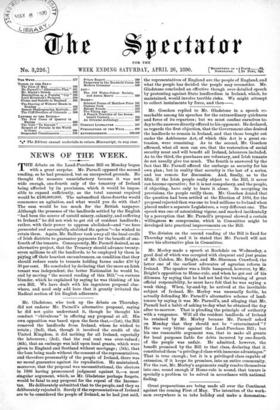Mr. Gladstone, who took up the debate on Thursday, did
not endorse Mr. Parnell's alternative proposal, saying he did not quite understand it, though he thought his conduct " chivalrous " in offering any proposal at all. His own opposition was based upon the facts that,—(1st), the Bill removed the landlords from Ireland, whom he wished to retain ; (2nd), that, though it involved the credit of the United Kingdom, it did nothing for all Ireland, especially the labourers ; (3rd), that the real rent was over-valued ; (4th), that an embargo was laid upon local grants, which were given to England and Scotland without mortgage ; (5th), that the loan being made without the consent of the representatives, and therefore presumably of the people of Ireland, there was no moral guarantee against its repudiation. He maintained, moreover, that the proposal was unconstitutional, the electors in 1886 having pronounced judgment against it,—a most singular argument, which, as Mr. Gladstone perhaps forgets, would be fatal to any proposal for the repeal of the Income- tax. He deliberately submitted that to the people, and they as deliberately rejected it. Surely if the representatives of Ireland are to be considered the people of Ireland, as he had just said,
the representatives of England are the people of England, and what the people has decided the people may reconsider. Mr. Gladstone concluded an effective though over-detailed speech by protesting against State landlordism in Ireland, which, he maintained, would involve terrible risks. We might attempt to collect instalments by force, and then—.


































